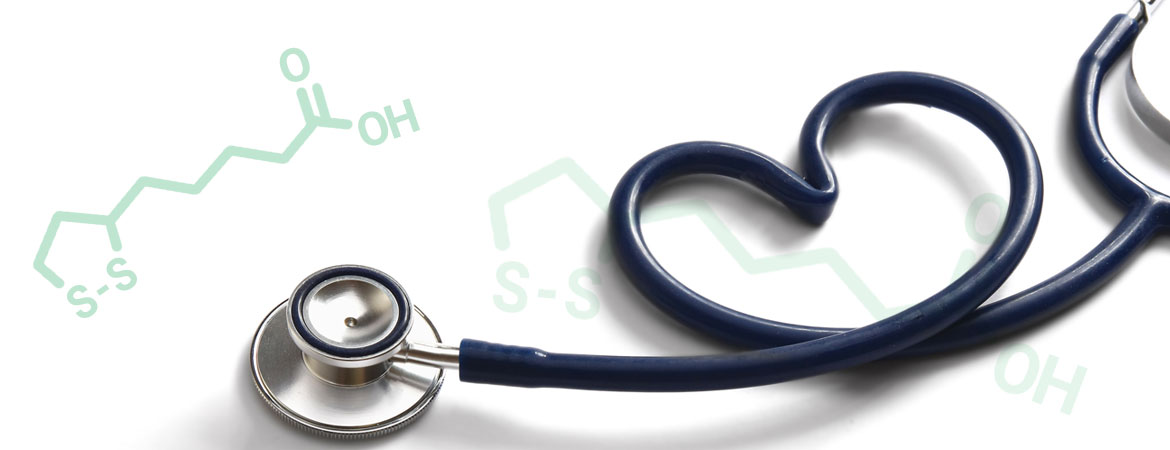Health Benefits of Lipoic Acid
Alpha Lipoic Acid (ALA) is a potent and effective antioxidant
It is an organosulfur compound derived from octanoic acid, also known as thioctic acid.It acts as a cofactor for several mitochondrial enzymes by catalyzing α-keto acid. It is a vitamin-like chemical called an antioxidant.
The antioxidant properties of lipoic acid vary:
It is used in the body to break down carbohydrates and to make energy for the other organs in the body.
It shows chelate activity for iron (Fe) and copper (Cu), preventing neurodegenerative diseases associated with oxidative stress.
It can directly neutralize ROS and helps amplify the positive effects of other important antioxidants in the body such as glutathione and coenzyme Q10—two essential compounds in the fight against aging and disease.
Alpha lipoic acid shows anti-inflammatory properties. Therefore, is used in various diseases that occur by oxidative stress.
It is particularly effective in cardiovascular diseases, including ischemic heart disease, hypertension, heart failure, and arteriosclerosis.
It can slow down aging, resulting in longer life because it improves blood flow and strengthens the immune system.
Many studies have confirmed that lipoic acid improves vascular function and reduces the burden of atherosclerotic plaque. It acts as an active chelator of transition metal ions, reducing redox, preventing lipid peroxidation in mitochondria.
Alpha Lipoic Acid reacts with ROS, such as peroxide anions, normalizes the activity of NADPH oxidase, and can prevent angiotensin II induced by macrophages, monocytes, and T cell infiltrates.
It is also able to block AT1 receptors by improving endothelial function and reducing plaque area in atherosclerosis.
It can also prevent oxidation of LDL by lowering LDL-C, OX-LDL, total cholesterol, and lipoprotein (α) concentrations as well as other oxidative biomarkers.
Clinical studies confirm that it can also reduce aortic expression of adhesion molecules and aortic accumulation of macrophages and proinflammatory cytokines, resulting in a reduced level of LDL and triglyceride concentration and increased HDL. It can also begin synthesizing the LDL receptor in the liver, resulting in increased cholesterol output in the liver and increased synthesis of apoprotein, an ingredient for inverted cholesterol transport. In conclusion, it has a direct effect on lipid formation and an indirect effect on blood lipid levels, leading to a reduced risk of atherosclerosis.
Hypertension increases the production of various inflammatory biomarkers. This increased production of biomarkers leads to reduced bioavailability of NO and excessive production of endothelin I, which in turn reduces endothelium-dependent vasodilation. Lipoic acid has a beneficial effect on preventing hypertension by lowering the level of inflammatory cytokines in the blood plasma, thus preventing these pathological changes in cells and normalizing changes in blood pressure.
Several clinical studies have shown to inhibit vascular overproduction of endothelin I, the primary vasoconstrictor. In addition, it significantly increases the synthesis of NO, the primary vasodilator, can also improve the plasma redox state and improve NO-mediated endothelium-mediated vasodilatation. In addition, it improves the loss of eNOS phosphorylation, which contributes to improving endothelial function. It is also known to inhibit the activation of TNF-alpha. Because it is a good chelating agent and can inhibit the production of monocyte adhesion molecules, thus improving endothelial function.
Finally, glucose (blood sugar) is transformed into energy from Alpha Lipoic Acid, yet glucose metabolism improves, resulting in a better response of the diabetic patient to insulin.
There are also indications that it can improve the function and performance of neurons in diabetes. This means it can be used for diabetes and nerve-associated symptoms of the disease (peripheral neuropathy), such as burning, pain and numbness in the legs and hands. (High doses of lipoic acid are approved in Germany to treat these symptoms.)
Click here to learn which Doctor's Formulas product contains Alpha Lipoic Acid!



